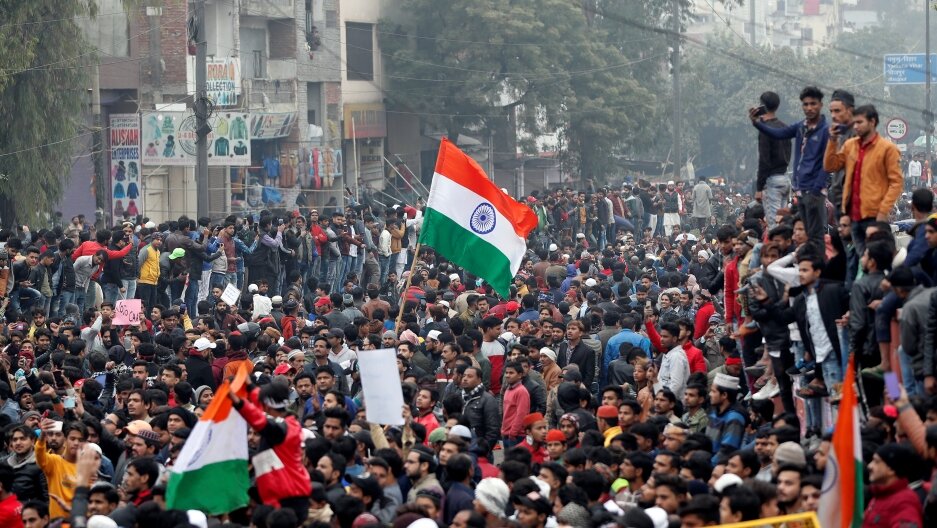Written By Daniel Bordman, Posted on April 16, 2020

Before the COVID-19 pandemic, there where many movements worldwide that had brought large amounts of civilians on to their respective streets. The most famous were the crowds in Hong Kong and across Iran were civilians pushed authoritarian governments for fundamental freedoms. One of the more interesting and complicated movements was what was developing in India around the Citizenship Amendment Act (CAA).
CAA is a law that grants a pathway to citizenship for immigrants/refugees of religious minorities coming into India from 3 neighbouring countries: Pakistan, Bangladesh and Afghanistan. Considering those three countries have a substantial Muslim majority population, the law, therefore, does not grant automatic citizenship to Muslims.
The announcement of the act before being passed resulted in widespread violence across the country from Islamist and Leftist forces. After months of violence, counter riots developed by pro-Modi authorities as Dehli was plagued by violence on both sides.
Perhaps the fascinating aspect of the whole CAA debate is why precisely the political Left lined on in opposition to a bill that widely expands protections to refugees? The central push back from the Left is the CAA is either “Islamophobic,” or undermines India’s existence as a secular state.
The most important thing to point out about CAA is that it is in no way takes away any rights from any Muslims in India. It expands the rights of Indians to religious minorities (non-Muslims) from neighbouring countries.
Accusations of Islamophobia have a way of instantly turning any issue into a highly contentious one, which is why we need to take a look at whether it is legitimate to exclude Muslims in Pakistan (95-98%), Bangladesh (90%) and Afghanistan (99.7%) from gaining fast-tracked Indian citizenship.
First, the vast majority of these countries are Muslim; it merely is logistical and economically impossible to offer citizenship to all of these people. Second, all of these countries have rather significant problems with religious discrimination primarily derived from hard-line Islamist factions within the country.
In Pakistan, religious discrimination is legally enshrined. Ahmadi Muslims are a smaller subset of the Islamic community, yet in the Islamic Republic of Pakistan, their existence is considered to be blasphemy. In the West, anyone who says that practicing the Ahmadiyya should be illegal would be labelled Islamophobic, but in Pakistan, this is just the tip of the iceberg of religious discrimination.
Last year Canada had to grant refugee status to Asia Bibi, a Christian mother who had spent eight years on death row. Her crime? Drinking from the wrong water fountain. After she was taken off of death row, the judges who spared her life had their lives under threat while massive mobs gathered to murder Aisa Bibi themselves.
In Bangladesh, bloggers who post ideas that run contrary to the Islamist narrative, they run the risk of being attacked in the streets with manchettes.
In Afghanistan, a 99.7% country that used to be a Hindu-Buddhist area historically has been a hotbed of religious discrimination, especially since the rise of the Taliban. In the 1970s, there around 700 000 Sikhs, now there are approximately 7 000 left. Just a few weeks ago, ISIS link terrorists conducted a horrific attack against the remaining few.
The non-Muslim populations in these countries are under constant threat, often of their very lives. One could understand why people with Islamist leanings inside India would oppose granting them protection, but from a purely logical perspective, the Left-wing opposition to CAA is absurd.
I would contend that fears of the “Islamophobia” label, mixed with the general reflexive polarization that seems to be constant in modern politics, is the primary driving force of the Left’s opposition to India’s CAA. However, the secularism argument needs to be addressed, as well.
I am a massive advocate for secularism and the separation of church and state. However, political secularism is often conflated with the complete absence of religion.
A clear violation of secularism would be to institute into law edicts from religious texts, i.e. if the US were to say the violating the edicts in Leviticus would carry criminal charges. But having the President quote the bible in a public address would not be.
When it comes to the law, it can’t be run by religion, but it clearly can’t ignore it. When it comes to who gets refugee status, different types of discrimination need to be seriously addressed, one of them being religious discrimination. To take the spiritual aspect out of religious discrimination is nonsensical, yet this is what a portion of the CAA opponents are advocating for.
Take, for example, Nazi Germany. If you were a neutral country at the same time and designing an ethical refugee program, would you treat each refugee claim with the same weight? If two people claimed refuge for religious discrimination from the Nazis, one of them being Jewish and the other being a blue-eyed blond-haired Christian, would you not prioritize the first claim?
The battle over CAA in India is on hold for now, but will likely flare up again once the quarantines and lockdowns are lifted. When it does, there will be a fascinating philosophical question to answer for the Left. Do they stand for the oppressed, or are they simply against anything a Right-leaning government does.
Daniel is the host of political satire show Uninterrupted, runs multiple podcasts and has written for a variety of publications. Daniel is also the communications coordinator of the Canadian Antisemitism Education Foundation. You can find him on Twitter here. Uninterrupted on YouTube
Very well presented. Every quote was awesome and thanks for sharing the content. Keep sharing and keep motivating others.